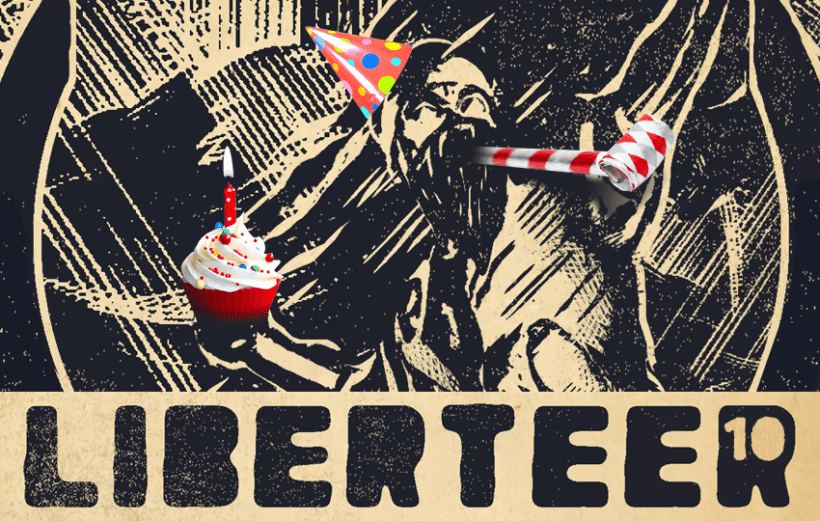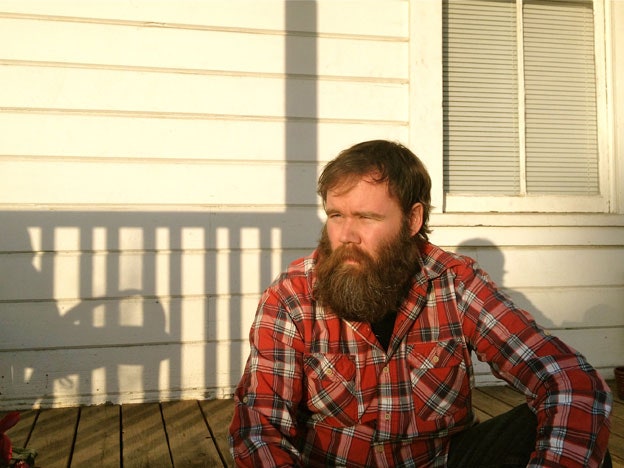
You know that Decibel has devoted itself to keeping your ears full of the newest, bloodiest music through online song and album premieres, the consistently excellent Demo:listen column, in-mag Upfront profiles and deep-dive features and cover stories. One danger of always seeking out fresh meat is ignoring past glories. We mostly do just fine in that department, too — see the Hall of Fame articles and the Fight Fire with Fire and Primitive Origins series — and in that spirit, let’s celebrate one such gem from 2012.
This week marks the 10th anniversary of the chaotic through-composed grind monument Better to Die on Your Feet Than Live on Your Knees by Liberteer, an anarchist project spearheaded by Matthew Widener (who also worked with Cretin, County Medical Examiners, Exhumed). Relapse blasted it into our consciousness at the end of January 2012, and it made such an impact that it wound up right smack in the middle of our Top 40 Albums list that December. Since then, there have been more than a hundred further issues of the magazine and 360 more incredible records cluttering our insatiable earholes, but Better to Die remains an affecting record with extraordinary idiosyncrasies that make it mandatory listening.
We asked Mr. Widener a few questions about his experience of the Liberteer album and the years since its release. We discussed musical compositions, the current landscape of politics (personal and societal) and the music that addresses it (or refuses to).
If you haven’t heard this record for a while, now is a perfect excuse to dig it back out and enjoy it all over again. If you’ve never heard it, wait no longer! And continue down the page to read Widener’s updated thoughts about that music and that time in his life. Grind on!
How much are Liberteer and that album present in your daily/weekly/monthly awareness at this point? In my mind, you and that music are pretty inextricable, but I’m wondering how much your own sense of self has to do with creating that music.
It’s a time capsule. I never really think about the album. Last time I listened to it was maybe five years ago. For some reason I find it uncomfortable to listen to any of the music or bands I play in. It’s silly because I usually enjoy the experience when I revisit. I’m just not a nostalgist. You said “inextricable” and that’s a good word. My friends swear they hear my idiosyncrasies in everything I write, so there must be a fingerprint there that’s more obvious than I thought. You can probably hear which Cretin songs I wrote by listening. I recently wrote a song as a guest for the new Exhumed album, and Matt Harvey was like, “Yep, classic Widenerisms.” If I had to analyze, I use lots of quirky diatonicism, atypical rhythms, and strongly dominant segues. I lean on pop song construction but also through-compose in sections, like classical. I believe in bridges. And for some reason I write callbacks, citing melodies across album songs. I think it comes from the fact that I don’t write metal by being inspired by other metal. I’m inspired by music with strong tonality. Most metal experimentalists are usually trying to invent new forms. I’m just trying to slide in pop and western harmonic tricks to juice up the emotions. Which is almost antithetical to grind, but that’s just how I write.
In retrospect, what political/philosophical ideas were most important to you when you were working on that record? What stands out about your mindset and goals at the time? Do you think differently about any of those things now?
Yeah, we all change. No one told me after I grew up that I’d have to keep growing up with every new decade. Such a bait and switch. What I liked most about these political ideas at the time was the feeling that there were answers. Boy was I disappointed later when I found out that there are no easy answers!
Before the album I was attending a university creative writing program. I’ve always been into stuff by Kafka, Dostoevsky, Beckett, Abe, Singer, Handke, Bernhard, that type. In my MFA program, I TA’d for one of my heroes, Booker Prize novelist James Kelman, and we struck up a friendship for a handful of years, and I learned a lot from him. His politics rubbed off on me some, though I was already an avowed leftist grind and crust fan. I thought it would be fun to do a more didactic, heavy-handed version of Napalm Death so that’s how the Liberteer album came to be. Some bona fide concepts in that political ideology, sure, the necessity of community and compassion, of fairness and culpability.
But now I’m wary of extremes that look like panaceas. In the decade since, my forties really sucked, just the typical rude tally of life. Both parents died of years-long, painful illnesses, lots of therapy, some breakdowns, touchstone middle-aged crap. It’s all so mundane, I’m not complaining. But a lot of my black-and-white thinking is now gray. I don’t trust anyone who claims to have all the answers. I’d tell this album to get lost. I’m suspicious of my immediate and easy feelings. Always use dialectics to find a synthesis. Neither hyper-capitalism nor anarchism are answers. Individualism and collectivism ignore the good in each other. Every living thing exists at the price of another. There’s no meaning, not even the ruse of invented meaning, and probably no free will. Are we merely Terror Management Theory puppets? How many people will each of us hurt before we die, it’s impossible to measure. I’m either functionally dishonest or sick with authenticism. No wonder we can’t agree on how to live with each other. Political dogma looks childish when it assumes the problem is only how to live rather than that we live because its prescriptions don’t account for our innate human tragedy.
If I made an album today? Probably read Camus’ Myth of Sisyphus for mood and eat a lot of mushrooms, set it to a ton of blasts and D-beats and sludge, terror with ruptures of beauty, a five minute fade out, final jump scare, throw drumstick through the cab speaker cone, smash the bass, finito. But no soapboxes.

Political conversations in the US have taken some pretty drastic turns since Better to Die was released. Since 2016, certainly, some people have been expecting a bunch of angry political music to speak to the moment, though that did not really materialize in any explicit way. Do you think Liberteer speaks to this political climate as much as it did in 2012, or do you feel like there are new urgent things to say that you hadn’t addressed back then? Has there been a shift in the issues that weigh on you now?
I just got back from Disneyland with my brother’s family, and it was alarming how many men there were wearing firearms t-shirts, extremist right-wing merch, and vaguely ominous “warrior culture” gear. To the happiest place on earth? I’m no expert but I think we all feel that something bad is coming. I’m not keen to fight or die for any of this. “Better To Run And Live a Coward.” Not a pithy album title. Is Liberteer more relevant to 2022 than 2012? Maybe it’s more dangerous. It’ll speak to hardcore folks, and I know it’s necessary to be angry about our situation, but what if before donning ourselves in the uniform of an enemy we instead try to defuse things? I’m just an armchair goof like the rest of us, but a “let’s dismantle the state” message isn’t rallying everyone who hears the klaxon alarm blaring the foothold of fascism, right? I’m starting to think that empathy and strategic nonviolence are what will probably save everyone. It’s funny, our theory of emotions says that all core feelings are needed, but it’s revealing that almost all of them—fear, anger, envy, disgust, and the like—they have pejorative connotations. With them we hurt others in order to pretend that it’s us who can’t be hurt. But alone in the list is love. Just the word is corny when I say it. And no cool album title in that, either—none that a younger me would appreciate. I just feel like love is true rebellion. You can also fight while hewing to love’s motives.
You said you listened to a bunch of propaganda music, which influenced the melodic lines you wrote. Can you still pick out what specific things you were drawing from?
I can’t pick out the themes anymore, but yes, I listened to a lot of bombastic, nationalistic music while writing that album. Not only anthems, but orchestral and film music, some pop music. It’s hard to port that over to metal. Metal has limitations that prevent convincing harmonic structure. The lack of bass guitar independence, that’s the biggest frustration for me. Metal bass is a sonic reinforcement rather than a harmonic role, due to the crowded saturation of all the instruments. Well, a lot of anthemic music requires chord inversions. That means the bass plays a different root. Look at the epic section in Holst’s The Planets—like, half of it is in first inversion. It’s not like you can write a cantus firmus in metal, so it’s hard to get some of the sophistication into a grind context. But it was never so much about trying to emulate propagandistic sounds. It was an excuse to play with unabashed diatonicism. I mean, why can’t we have happy grindcore songs? Stirring? Why not? Why do we ignore the seven notes that we westerners have been conditioned since infancy to hear as magical? And how can we make someone feel frisson and wonderment when we just stick to sour modes and flat seconds and atonalism all the time? It’s never made sense to me.
Have you heard anything like Better to Die being recorded/released since then, anything that has a kinship with your approach to that music?
I haven’t, not in grind. Grind is pretty proud of the “no notes” tattoo culture, the whole anti-music attitude. Honestly, I think the diatonicism in most folk, power, and black metal isn’t great, so I can’t blame grind for purifying itself. I remember writing the Liberteer album, this one riff that blasted in Lydian like Mahler’s 5th “Chorale in D” mixed with the E.T. flying theme. I recorded it. I adored it. It was the best thing on the album and I cut it. I just didn’t think anyone would accept it. Back then I was still thinking about audience. I don’t think that way anymore. Now there’s just one person in the audience and it’s me, period. The problem I didn’t anticipate in this liberation is that it’s actually easy to appease others but very hard appeasing an audience of one. There’s paralysis in the face of perfectionism when you’re writing only to you. I mean, how can you live up to who you wish you could be?
There’s a melodic throughline in the record that has always sounded to me like the Isengard Uruks’ theme from Peter Jackson’s Lord of the Rings. Is that a musical quote for thematic purposes, or is it just me being a super huge nerd?
Good ear. At the time I was figuring out Shore’s stuff, comparing it to Wagner, figuring out how they do all the chromatic mediant harmony.
Was the Liberteer record a direct continuation of what Citizen was doing, or do you see that music as categorically separate?
In ways. It was sort of a correction, a redefinition.
What kind of attention did you feel Liberteer was getting around the album’s release – from how Relapse handled it, to zine interviews/reviews at the time, to any feedback you got from friends or the listening public? How have you processed the way people were engaging with your music?
I don’t think many grind fans have heard it. Zine interviews and reviews were fine. Relapse was and always is amazing. It was just an album that didn’t make a blip—that’s most albums, really. I think people assume all bands are engaging with fans but that’s not true. I released the album and that was it. So the occasional kind words that do make its way to a musician are more endearing than anyone realizes. Like, I remember when a stranger complimented my smile years ago, and it’s not even a memory for that person but it etched my brain forever. Imagine how much more intense it is to release an album and hear nothing for years, before someone finds you and says it’s been a part of them, and you realize your efforts and all your vulnerability didn’t actually die in the wild but lived these unique little lives in other adoptive ears, fueling workout playlists, fantasies while in the commuter lane. I don’t even have a word for that emotion, it’s too tangled and rare. It has nothing to do with ego and everything to do with the quiet realization that we’re really all the same, if that makes any sense. I bet acclaim feels great, but can someone tell me if it’s more nourishing than that?
A couple years after Better to Die, Cretin released Stranger. Beyond that, what has your musical life consisted of in the time since the Liberteer album? More broadly, what about your creative life in general (writing, etc.)?
After those albums I paused to focus on my career, but now I’m in a good place to have hobbies again. I just penned a song for the new Exhumed album as a guest composer, and I’ve heard the studio recording and love the hell out of it. Maybe I’ll do some music soon. I’ve been writing fiction again, nothing fancy, just horror stories for myself. A lot of my creativity goes into my group’s weekly roleplaying games, nerd energy, pretty much a constant since 1982.
What music have you found most stirring and interesting recently? Is there anything grabbing you now that you think more people should latch onto?
When I want to hear new music, I read the Decibel site. There’s so much great music coming out. I’m not hip to anything rare or overlooked really, I’m just listening to the stuff everyone else is. I’ll say that I enjoy the rougher recorded stuff, more of the demos, splits, and EPs. I don’t listen to much super-produced metal anymore. Click tracks, cut and paste recording, quadruple tracked guitars, stacked drum samples, every sound carved, compressed, balanced, sanitized. It starts to resemble a type of politeness, right? I have to blast the volume to approximate any sort of heaviness. I apologize for being a romantic right now. If you want to find exciting, dangerous music, here’s a trick—keep your volume low, at first. Your ears know what a band in a room sounds like, and that production sounds alive and impolite at any volume. Kick chain squeak, riff flubs, traveling tempi, stray harmonics, bass fret rattle as a ship’s wooden creak, mic feedback jabs, popping tubes, double kicks loping like strayed windshield wipers. You don’t have to keep bad playing in, but how about we don’t use a click and we don’t ask drummers to pretend to be one? My god, a tempo ramp on a fill can make all the difference, let the drummer conduct. When something sounds real, it teeters with risk. You know, my uncle was a circus performer, and I could barely stand the anxiety of watching performances. We’re all there to hope that you live? I couldn’t watch as a kid. He broke his back three times, but that’s the thrill. Make no mistake, a grindcore band is on a high wire. I’ve been in bands playing songs we weren’t skilled enough to perform, known the rush of pulling it off, seen the relief and camaraderie in my mates’ faces, and that’s what I want to visualize when I listen to music, not ProTools. ProTools isn’t breaking its back for anyone. Hey, you know what sounds more savage than four stacked high-gain guitars in your left channel? Just one. Monolithic and cranked, hallmarked by string-rub and pick scrape, your ear makes it absolutely giant. This is almost alien in bigger albums today, but so much of what I hear on the blog right now sounds like we might be making a return. As always, keep your eyes on the underground.





